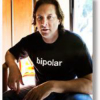Andy Behrman

Andy Behrman
Andy Behrman was born 1962 and is an American writer of non-fiction as well as a mental health advocate and national speaker. He is the author of Electroboy: A Memoir of Mania which was published by Random House in 2002. "Electroboy" traces his career dealing forgeries of the art of Mark Kostabi. Behrman was formerly a spokesman for Bristol Myers Squibb until he publicly criticized them for their marketing techniques and made a YouTube video titled, "Abilify Kills." Behrman lives...
NationalityAmerican
ProfessionWriter
CountryUnited States of America
Like most manic depressives, some of my symptoms included racing thoughts that I simply had to act upon - flying from New York to Paris and taking the train to Berlin; flying to Argentina in the middle of the night; spending tens of thousands of dollars on unnecessary garments, dinners and gifts.
I think, when it comes to psychiatry, that a lot of people are overmedicated. I think when it comes to ECT a lot of people go through too much. I think there's a lot of guesswork in psychiatry.
People accuse me of glamorizing mental illness. Looking back sometimes, that's true. But I don't feel guilty.
Manic depression is a type of depression, technically, and it's the opposite of uni-polar. Manic depression is also called bi-polar disorder. Some people don't like to call it that because they think it makes it sound too nice, when the reality is if you have manic-depression you have manic-depression.
After graduation in June of 1984, I moved to Manhattan. My first stop was a psychiatrist, who in less than our first fifty-minute session again diagnosed me with depression.
I think almost all manic depressives exhibit some kind of criminal behaviour, even if it's something as minimal as shoplifting, but then they often go on to bigger and better things - in my case, it was fraud.
I counterfeited Mark Kostabi's artworks. During the eighties, Mark didn't paint his own paintings. Instead, he had other artists painting them, and he just added his signature. So what I did was to use some of the same painters, and signed his name myself.
I couldn't sleep for nights on end, as my brain felt like there were thoughts colliding within it; I obsessed over small details, from saving pennies and polishing each one of them to washing my clothing over and over in the washing machine.
Friends and family were convinced I was functioning just fine because I was efficient, productive and successful - who wouldn't be working twenty hour days? I had everybody fooled with my illness.
In total, I was diagnosed with depression by eight psychotherapists and psychiatrists over a period of thirteen years. Diagnosed wrong. Absolutely wrong. My accurate diagnosis was manic depression, or what we call bipolar disorder today.
I felt like I was the only person on the planet with this 'thing called depression', and I remember being frightened. I was knocked out and dopey, and I cried all of the time.
Money is a huge issue for manic depressives. Sometimes the problem is not nearly on the same scale as it has been for me, but nonetheless, it's difficult to deal with. Many get themselves into debt that can take years to clear up, write bad cheques, shoplift and borrow huge amounts from family and friends.
There are lots of people with mental health disabilities, and that's just the way their life is; it's not like you see it in the movies.
My eating habits are the only behaviour of mine that are still manic. I can't walk by a restaurant, a bakery, an ice-cream store or a candy store without making a purchase; the amount of calories I take in today are at least five times as many as I took before starting on all of this medication.